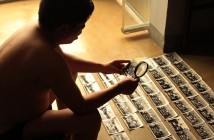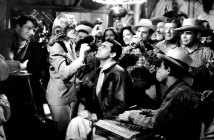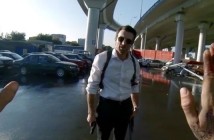
Editor’s Note: The following review is part of our coverage of TIFF’s winter film series On the Road: The Films of Wim Wenders. For more information, visit tiff.net and follow TIFF on Twitter at @TIFF_NET.
Sometimes, it’s hard to tell whether some movies are impossibly complicated or endearingly simple. Such is life in Paris, Texas, Wim Wenders’s 1984 ode to the American southwest. Fragmented into half-hour segments which each stand with their own tone and main cast, this classic from the German filmmaker crafts a visual journey so lush with emotion and longing, I’m amazed it can fit in just one movie (albeit with a hefty two-and-a-half hour runtime).
Wenders has the delicate touch needed to show his astute level of understanding of how fraternal dissociations can repair after an unknown tragedy for one side.
Paris, Texas opens in a nearby south Texas desert, with sweeping landscapes of terraced plateaus dwarfing a disoriented Travis (Harry Dean Stanton), who has been wandering (unshaven and tanned) for perhaps days, or even four years. When brother Walt (Dean Stockwell) flies from his home in the Los Angeles suburbs to come pick him up, answers are slow to reveal themselves. Without a clue of Travis’s mental stability or reasons for wandering through the dead, vast wilderness, the pair drive back to Walt’s house, where his wife (Aurore Clement) and him have been caring for Travis’s adolescent son, Hunter (Hunter Carson) for nearly four years. Travis and Hunter soon reconnect, and drive the reverse route Travis and Walt just took: back to south Texas in search for an abandoned life.

Wenders’s film took home the Palme d’or in 1984 by total consent on the jury, and it isn’t difficult to understand how Paris, Texas reaches to the hearts of a broad group of film-loving individuals. On the most personal level, the writers concoct an atmosphere of unspoken remorse. Wenders has the delicate touch needed to show his astute level of understanding of how fraternal dissociations can repair after an unknown tragedy for one side. Yet on a purely cinematic level, the filmmakers are able to withhold information with a coy playfulness, injecting into the story a jolt of mystery. It’s potent, but not overwhelming to the emotion which helps Paris, Texas succeed.
Just as warm and wistful is Ry Cooder’s score, which is as effective when driving across the plains in a beat up truck as it is watching nostalgic family videos in the den. The guitar-led soundtrack has all the twang needed to match the gorgeous photography, hinting that the real story is in Texas even when the narrative takes us to Los Angeles. Wenders might set a pivotal moment in the film (the reunion of Travis and his son) in sunny California, but the critical mass of Paris, Texas happens in the titular southern state.
Moving from a broad tale of lost happiness to a specific, painful showing of honesty, we learn exactly what we might expect, yet it feels entirely unexpected.
All the conversations, untold histories, and awkward acquaintances build up to a single, evocative monologue. Under other circumstances, this could feel lazy at best, or else downright cheap to the audience. Yet here, the setup is so earnest, we don’t want to hear what Travis has to say so much as we need to hear it. Moving from a broad tale of lost happiness to a specific, painful showing of honesty, we learn exactly what we might expect, yet it feels entirely unexpected. Most of the monologue is delivered with the camera not on the speaker, but firmly in the face of the sole recipient. You can call it an actor’s showcase, but in reality it’s a microcosm of the pained emotionalism seen throughout the film. It’s touching and it’s heartbreaking but not without a hint of hope.
You can call it an actor’s showcase, but in reality it’s a microcosm of the pained emotionalism seen throughout the film. It’s touching and it’s heartbreaking but not without a hint of hope.



